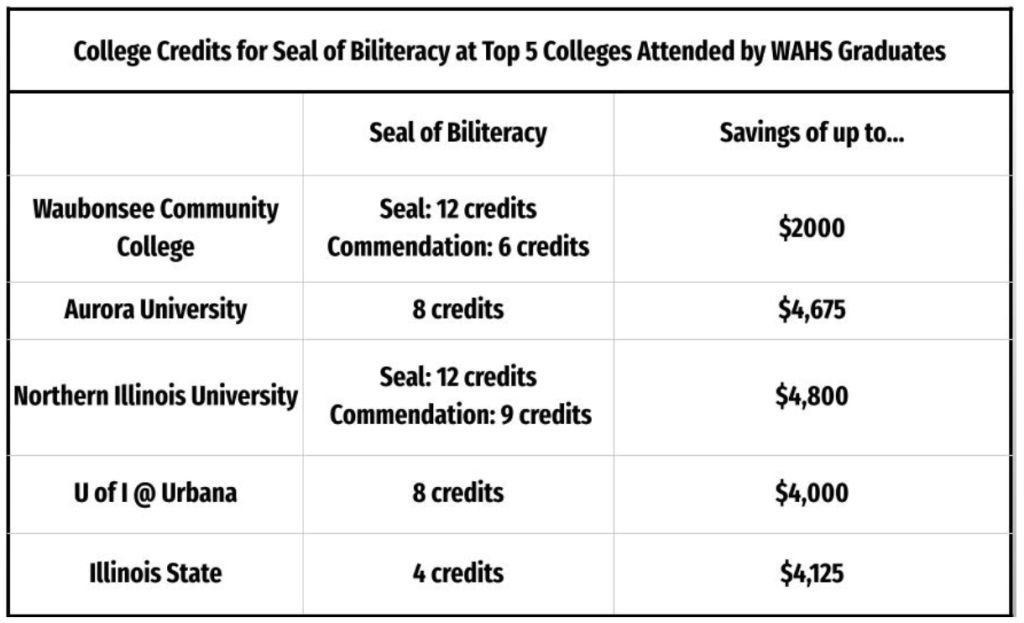
Multilingual learners at West Aurora High School in Illinois garnered outstanding results when personally invited to a free testing opportunity to earn biliteracy recognition. The project shows great promise for English learners everywhere. The 23 students who participated could collectively save at least $25,000 in college tuition. It also had a positive impact on students, their families, and the community by highlighting the value their multilingualism brings to their postsecondary endeavors.
West Aurora sought to increase the number of English learners earning the Seal of Biliteracy or Commendation toward Biliteracy. They ran their project using 2022 ACCESS 2.0 data and a budget of $600. Thirty seniors scored a 3.5 or higher in the literacy domain of ACCESS and indicated they had an ability to read and write in an additional language. Based on their English proficiency alone, they were already halfway to Illinois criteria for a Commendation toward Biliteracy. Educators congratulated each student in person on earning a 3.5 or higher on ACCESS Literacy and asked each student what their postsecondary plans were. Most students indicated that they would be attending Waubonsee Community College next year.
The educators then shared with each student that they would have a free opportunity to take a test similar to ACCESS (AAPPL) to demonstrate their proficiency in their additional language and that if they earned high enough scores, they would earn a minimum of six to twelve credits at Illinois public colleges. At Waubonsee, this would mean a savings of approximately $1,000 for a commendation and $2,000 for a seal. After educators met with students individually, each student’s parents were contacted in their home language to congratulate them on their student’s proficiency in English, notify them of the free assessment opportunity, and share the personalized postsecondary benefits their student would earn by adding either a Commendation or a Seal to their transcript.
Of 23 students who attended the free testing session, 22 (or 96%) earned biliteracy recognition: three students earned a Seal of Biliteracy, and 19 earned a Commendation toward Biliteracy. Fifteen of the 23 met Seal of Biliteracy–level criteria on their additional language assessment.
Due to the outstanding results of this project, West Aurora plans to offer a personalized invitation to every junior and senior scoring 3.5 or higher on ACCESS Literacy to participate in a free opportunity to demonstrate linguistic competency for the Seal of Biliteracy.
Additionally, free opportunities will also be expanded to students participating in the Heritage Spanish and World Language programs. “We are thrilled to recognize and celebrate the value multilingual students bring to Aurora and to highlight how their biliteracy can propel them into their postsecondary endeavors.”

Background on Seal/Commendation toward Biliteracy
Postsecondary benefits
- AAPPL and STAMP Testing can be used as a qualifier for the Seal of Biliteracy, further expanding access to college credit to more students (see Figure 1 for sample of credits awarded)
- Earning a Seal or Commendation toward Biliteracy can reduce the cost of attending college
- Highlights language competency for careers in translation
- Students who participated in pilot administration were motivated to score higher on other proficiency exams (ACCESS and SAT)
Existing barriers to English learners participating in Seal of Biliteracy testing
- Personalized access to information about the postsecondary benefits of earning a biliteracy recognition (college credits, job opportunities)
- Scheduling testing outside of the school day
- Cost (approximately $25 for AAPPL or STAMP)
Pilot Population
Ninety seniors took ACCESS 2.0
- Five seniors had no scores
- Eighty-five seniors had ACCESS 2.0 scores
- Delimitation: Seniors were selected to participate in the pilot and take AAPPL or Alta in their additional language based on already qualifying for at least a Commendation toward Biliteracy on ACCESS 2022
- Thirty-six seniors scored 3.5 or higher on ACCESS 2.0 Literacy (lowest English criteria for commendation)
- One senior had already earned a Seal of Biliteracy
Survey Methods
- Thirty-five seniors classified as English learners were invited to participate in testing on May 31 funded by the district (projected budget of approximately $600)
- All students and parents were personally contacted and congratulated on their ACCESS scores and extended personal invitations to take a free AAPPL exam in their additional language. Students’ postsecondary plans were collected and were explained the benefits of earning a biliteracy distinction on their transcripts
- Five seniors declined to participate due to additional language literacy
Results
Twenty-three students attended testing
- Seven were no-shows on the day of the exam although they previously expressed interest
- Twenty-two students earned awards
- Three students earned a Seal of Biliteracy
- Fifteen met Seal of Biliteracy criteria in their additional languages (Spanish, Yoruba, and Swahili) including several perfect scores—if the students had had more time, it is likely they could have earned a Seal through pursuing a retake option in English
- 19 students earned a Commendation toward Biliteracy, including 17 in Spanish, one in Swahili, and one in Yoruba
Most of the awards were earned by students attending Waubonsee Community College next year
- The three students who earned a Seal of Biliteracy will receive twelve credit hours each at Waubonsee for a total savings of $2,000 each in tuition ($6,000 total in tuition savings for families for $60 of tests covered by the district)
- The 19 students who earned a Commendation toward Biliteracy will each receive six credit hours at Waubonsee Community College for a total savings of $1,000 each in tuition ($19,000 total in tuition savings for families for $400 of tests covered by the district)
In total, SD129 families of English learners could save $25,000 in tuition for approximately $460 in testing
Students and families expressed gratitude for the opportunity to participate as well as appreciated our efforts in highlighting their students’ bilingualism as an asset to their postsecondary endeavors.
Through this pilot, we learned the following can hinder our English learner population in pursuing a biliteracy distinction:
- Providing personalized information about the postsecondary benefits of earning a biliteracy recognition (college credits, job opportunities)
- Scheduling testing outside of the school day
- Cost
When two of the three barriers were addressed, 22 of 23 students demonstrated that they were capable of earning at least a Commendation without any language-specific coaching or interventions.
Several expressed interest in studying and retaking exams if the opportunity were available. We are hopeful that starting in the fall next year and addressing all three barriers will allow more students to take advantage of the benefits of earning biliteracy recognition.
Recommendations
Practitioners
- Encourage students who reach 3.5 Literacy or higher on ACCESS 2.0 reporting to pursue a proficiency exam in their L1—96% of students who attended our testing day qualified for at least a Commendation
- Test in early fall of students’ junior year or freshmen year for ELs who were reclassified in middle school—provides opportunity for retake and proactive postsecondary planning
- Address identified barriers to participating in testing (cost, opportunity, information)
- Use testing as an opportunity to highlight bilingualism as postsecondary asset (build student efficacy for testing in English (ACCESS or SAT))
- Communicate with families about the cost-saving opportunities for earning biliteracy recognition
- Remind students to advocate for credits at their postsecondary institutions
Policy makers
- Make funding widely available for high school ELs to demonstrate their proficiency in their L1s, due to cost savings for students at postsecondary institutions
- College Credits accrued during high school influence postsecondary perseverance and completion
- More seamless data tracking for college credits earned at high schools in higher education ( dual credit, AP, Seal)
Dr. Christine Anderson is a curriculum leader serving multilingual learners in West Aurora School District 129, Illinois. She is also an adjunct professor for the Teaching Diverse Learners graduate program at Aurora University.







